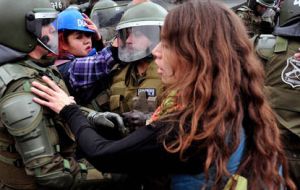MercoPress. South Atlantic News Agency
Chilean students and workers take to the streets to demand education reform
 But there were also clashes with minority violent groups
But there were also clashes with minority violent groups An estimated one hundred thousand people turned out Wednesday on another day of demonstrations called by students in several Chilean cities, with union members, port workers and miners joining the throng.
Several clashes between police and masked protesters were reported and the Carabineros - Chile's militarized police - said that 98 people were arrested and four officers were injured in various ways, although no mention was made of any civilian casualties.
The governor of the Santiago metropolitan area, Juan Antonio Peribonio, said at a press conference that the government had filed criminal complaints against the people responsible for the attacks on law enforcement personnel.
“We have almost 100 people under arrest, many of them ... for carrying incendiary devices,” he said. Police used tear gas and water cannons to disrupt the protests.
Peribonio said that the damage resulting from the rioting amounted to millions of dollars in both the public and private sectors, noting that “bus stops, traffic lights, commercial establishments, among others” had been damaged.
Two weeks after the most recent demonstration, Santiago was the scene of the largest protest with three simultaneous marches in different parts of the capital that converged in Heroes Square, just a few blocks from the La Moneda presidential palace.
University and high school students have been mobilized since 2011 to demand free and high-quality public education, along with the elimination of the profit motive at private universities.
In contrast to other protests, however, on Wednesday the student movement received the support of the CUT (workers united centre), the professors union, the Federation of Port Workers and the CTC copper union, among other labour organizations.
Protestors also want to change the Chilean tax system to make the rich pay more in a country that despite the copper bonanza is also plagued by vast income inequality and a costly education system that many say is unfair.
“This has to do with discontent that is deeply rooted in many sectors of society. But we’re the first ones to sympathize with people who are innocent victims of this violence, because there’s no way to justify these types of clashes,” Andres Fielbaum, president of the University of Chile student federation told state television. After two years of student marches that often paralyzed Chile’s major cities and stoked expectations of change, students say they have seen few real benefits and the dispute over education reform remains a key electoral issue ahead of the Nov. 17 presidential election.




Top Comments
Disclaimer & comment rules-

-

-

Read all comments'... to demand free and high-quality public education, along with the elimination of the profit motive at private universities.'
Jun 27th, 2013 - 09:11 am 0'Free' and 'high-quality' are a bit oxymoronic. Somebody has to pay, but presumably not the students.
'Elimination of the profit motive' is a non. seq. for private industry. For example, shareholders tend to get upset. Argentina can offer Chile some advice here - nationalise all aspects of education within the country, especially all those owned by foreigners. And/or .. start a war.
Chile has evolved beyond the simplistic and self-destructive solutions.
And re-structuring of the state education system is already agreed.
Anything that is “free” is worth exactly what you pay for it. Moreover, violent clashes are not the way. According to the aphorism, “violence is the last refuge of the incompetent”. Who would think that a masked protester/student was worth educating for free? All they are worth is jail time. In fact, perhaps the government should make it clear that, even if the costs of education are significantly reduced, students involved in violence will not benefit.
Jun 27th, 2013 - 10:28 am 0Chilean education system is for free from pre-school to the last year of high school, more tan 12 years, which is run by Municipalties with MoE supervisión.
Jun 27th, 2013 - 12:17 pm 0It coexist with private schools that receive a subvension from the state and plus a payment from families of the same amount.(called private-subventioneed) with a higher quality tan the first. Moreover, there are totally private schools where the families pays for the whole cost (the more expensives and selectives)
The difference between them is got ten from the way they are ruled.....
The first belong to all so they belong to nobody.....political parties at the Municipality take over them and the executives are political and no thecnical reaseon to choose them.....result is a bad administration with lot of financial resources lost, a lot of teachers strikes, students strikes, workers strikes, a lack of interest for the students themselves...Any family with posibilities take their cildren out to a private- subventioned school.....
The second, private subventioned schools.....they are from churches (protestant, catholic, adventist, etc.) and other societies like some of teachers, or investers, so all of them have visible heads that ask for good results with kids from a very mixed society extraction .....it has meant that with almost the same resources that the first schools the have higher result in all order....This is the most preferred kind of schools which bring a very reliable future for the students.....
The third, the totally private schools are the top in quality but also they are the top in cost so the richiest families can afford them, becoming high socially selective and future reliable...
The third level of education are the institutes, colleges or universities, some of them state owned and others from the catholic church and they form a group called the traditional universities and to get there studentes must approve a final test. For the privates it´s no necessary. All of the are payed by families
Commenting for this story is now closed.
If you have a Facebook account, become a fan and comment on our Facebook Page!